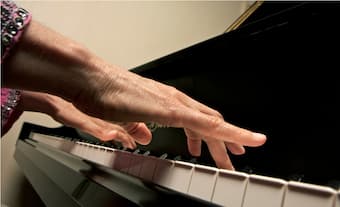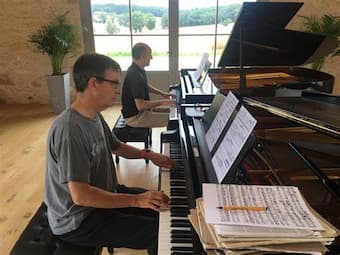by
It may be two years or twenty since you last touched a piano, but however long the absence, taking the decision to return to playing is exciting, challenging and just a little trepidatious.
 Stick with the familiar and play the music you learnt before
Stick with the familiar and play the music you learnt before
To get back in to the habit of playing, start by returning to music you have previously learnt. You may be surprised at how much remains in the fingers and brain, and while facility, nimbleness and technique may be rusty, it shouldn’t take too long to find the music flowing again, especially if you learnt and practised it carefully in the past.
Take time to warm up
You may like to play scales or exercises to warm up, but simple yoga or Pilates-style exercises, done away from the piano, can be very helpful in warming up fingers and arms and getting the blood flowing. This kind of warm up can also be a useful head-clearing exercise to help you focus when you go to the piano.
You don’t have to play scales or exercises!
Some people swear by scales, arpeggios and technical exercises while others run a mile from them. As a returner, you are under no obligation to play scales or exercises. While they may be helpful in improving finger dexterity and velocity, many exercises can be tedious and repetitive. Instead try and create exercises from the music you are playing – it will be far more useful and, importantly, relevant.

Invest in a decent instrument
If you are serious about returning to the piano, a good instrument is essential. It needn’t be an acoustic piano; there are many very high-quality digital instruments to choose from. Select one with a full-size keyboard and properly weighted keys which imitate the action of a real piano. The benefits of a digital instrument are that you can adjust the volume and play with headphones so as not to disturb other members of your household or neighbours, and most digital instruments allow you to record yourself or connect to apps which provide accompaniments or a rhythm section which makes playing even more fun!
Posture is important
You’ve got a good instrument, now invest in a proper adjustable piano stool or bench. Good posture enables you to play better, avoid tiredness and injury.
Little and often
Your new-found enthusiasm for the piano may lead you to play for hours on end over the weekend but hardly at all during the week. Instead of a long practice session, aim for shorter periods at the piano, every day if possible, or at least 5 days out of 7. Routine and regularity of practice are important for progress.
Consider taking lessons
A teacher can be a valuable support, offering advice on technique, productive practising, repertoire, performance practice, and more. Choose carefully: the pupil-teacher relationship is a very special one and a good relationship will foster progress and musical development. Ask for recommendations from other people and take some trial lessons to find the right teacher for you.

Pianists at Finchcocks course
Go on a piano course
Piano courses are a great way to meet other like-minded people – and you’ll be surprised how many returners there are out there! Courses also offer the opportunity to study with different teachers, hear other people playing, get tips on practising, chat to other pianists, and discover repertoire. Many courses in the UK cater for students of all levels, including those at Finchcocks in Kent and Jackdaws in Somerset.
Join a piano club
If you fancy improving your performance skills in a supportive friendly environment, consider joining a piano club. You’ll meet other adult pianists, hear lots of different repertoire, have an opportunity to exchange ideas, and enjoy a social life connected to the piano. Piano clubs offer regular performance opportunities which can help build confidence and fluency in your playing.
Listen widely
Listening, both to CDs or via streaming or going to live concerts, is a great way to discover new repertoire or be inspired by hearing the music you’re learning played by master musicians.
Buy good-quality scores
Cheap, flimsy scores don’t last long and are often littered with editorial inconsistencies. If you’re serious about your music, invest in decent sheet music and where possible buy Urtext scores (e.g. Henle, Barenreiter or Weiner editions) which have useful commentaries, annotations, fingering suggestions and clear typesetting on good-quality paper.
Play the music you want to play
One of the most satisfying aspects of being an adult pianist is that you can choose what repertoire to play. Don’t let people tell you to play certain repertoire because “it’s good for you”! If you don’t enjoy the music, you won’t want to practice. As pianists we are spoilt for choice and there really is music out there to suit every taste.
Above all, enjoy the piano!